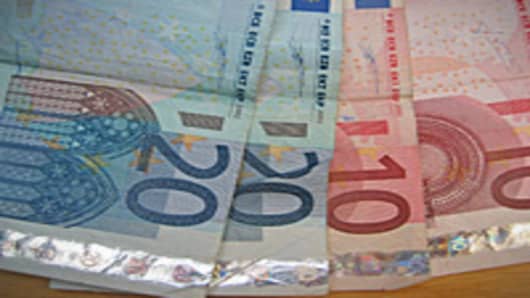As European markets opened, the yield on 10-year Spanish bonds dropped by 83 basis points, while comparable Italian yields fell 79 basis points. News agencies cited traders as saying the E.C.B. was intervening in the secondary market to buy the securities from those two countries.
The E.C.B. declined to comment Monday. But in a statement issued late Sunday after an emergency conference call, the central bank said it would “actively implement” its bond-buying program to address “dysfunctional market segments.” It did not specify which bonds it would buy, but hinted it would be Spain and Italy by welcoming their efforts to restructure their economies and cut spending.
Previously the bond-buying had been limited to bonds from Greece, Portugal and Ireland — the three euro-zone countries that have already received international bailouts. Fears that the bloc’s sovereign debt crisis would spread to the much bigger economies of Italy or Spain had contributed greatly to recent market losses.
European leaders agreed last month to revamp their bailout fund to allow it to purchase bonds on the secondary market, but those powers still have to be drafted and ratified by national parliaments, which will take weeks, at best.
At least until then, the E.C.B. has been reluctantly saddled with the primary role in addressing the crisis of confidence in the region’s government finances. The bank got backing late Sunday from the Group of 7 leading industrialized nations, which said late Sunday that it was ready to “take all necessary measures to support financial stability and growth.”
Gilles Moëc, an economist in London with Deutsche Bank, said the central bank’s move was “not a silver bullet,” especially considering the impact of the downgrade and lingering concerns about the economic recovery there.
Still, he described it as another positive development for European cohesion.
“For all their delays and contorted procedures, the European partners since the beginning of this crisis have always moved, ultimately, in the same direction: creating evermore financial solidarity across its members, and breaking taboo after taboo to do so,” he wrote in a research note.
European equities opened higher despite a sell-off earlier in Asia, but the rally fizzled, dashing hopes that the E.C.B.’s actions would be enough to soothe broader market jitters.
In afternoon trading Monday, the Euro Stoxx 50 index, a barometer of euro zone blue chips, was down about 1 percent. Financial shares, which had been up by as much as 5 percent earlier, retreated into negative territory. The FTSE 100 index in London fell nearly 2 percent.
The euro fell to $1.4263 from $1.4282 late Friday in New York. But the dollar hit new lows against the Swiss franc, declining to 0.7485 franc from 0.7674 franc, and fell to 77.65 yen from 78.40 yen, before recovering a bit.
Standard & Poor’s 500 index futures fell 2.4 percent, suggesting stocks would fall at the opening on Wall Street.
In Asia, the Tokyo benchmark Nikkei 225 stock average fell 2.2 percent. The main Sydney market index, the S&P/ASX 200, fell 2.9 percent. In Hong Kong, the Hang Seng index fell 2.2 percent, and in Shanghai the composite index closed 3.8 percent lower.
The U.S. downgrade and European debt crisis are not the only problems weighing on equities. The recovery in the global economy is lagging the expectations of many analysts, with the Organization for Economic Cooperation and Development reporting Monday that its composite leading indicators for June point to “a slowdown in activity in most OECD countries and major non-member economies.”
U.S. crude oil futures for September delivery fell 3.6 percent to $83.76 a barrel.
Comex gold futures rose 3.7 percent to $1,712.40 an ounce, their first time to break through $1,700. Adjusted for inflation, however, gold remains well below its record of more than $2,400 an ounce, according to Capital Economics.
By the time Standard & Poor’s made its move on Friday, Wall Street had suffered its worst week since the financial crisis, with the Dow Jones industrial average falling 5.75 percent, a slide punctuated by a 512-point drop on Thursday.
On Wall Street, traders and strategists trekked to their offices on Sunday in scenes reminiscent of the fateful weekend before Lehman Brothers collapsed in 2008. Bank of America , Merrill Lynch, Barclays, Credit Suisse and Morgan Stanley all hosted conference calls for anxious investors, and traders plotted strategy for what they expected to be a tumultuous day on Monday.
“Markets have lost confidence in the economic recovery and policy makers. This is increasing the risk of bringing about a self-fulfilling prophecy, with markets driving down the economy,” Robert Subbaraman, chief economist for Asia at Nomura, said in a conference call Monday.



